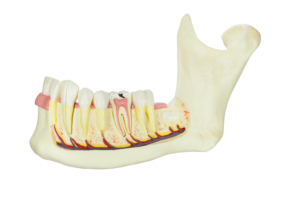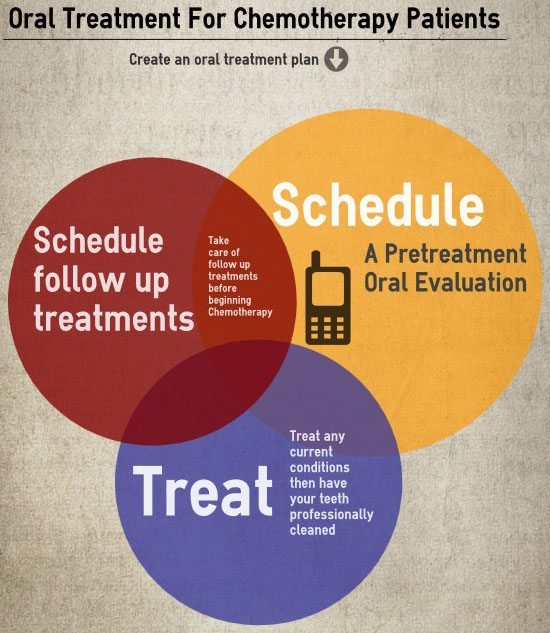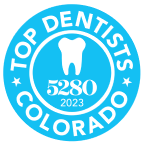dental care for cancer patients undergoing treatment
At Metropolitan Dental Care, our team understands that a cancer diagnosis feels overwhelming. We’re here to help you navigate the waters by listening to your concerns, answering questions, and providing guidance on how to best handle dental care while undergoing cancer treatment. Our Denver dentists are sensitive to your needs and feelings, and we are here for you.
The most common cancer treatments are chemotherapy and radiation (or radiotherapy). With these treatments, side effects are to be expected, though you may not be familiar with the effects cancer treatment can have on oral health.
For instance, the toxicity of chemotherapy that causes hair loss also affects the rapidly growing cells in the mouth. This causes damage to the mucous membranes and gum tissue. Mouth sores are very common.
We will explain and answer all of your questions about dental care for cancer patients. Please know that you can call our office any time for specific information or to schedule an appointment.
Poor oral health, as well as dry mouth syndrome, can also compromise your immune system. This could be detrimental for patients already experiencing a weakened immune system due to cancer treatment. So, diligent oral care during chemotherapy and/or radiation is very important.
how your oral and physical health are related
All the systems of your body are beautifully woven together and designed to function as a whole, balanced unit. The mouth is one complex component of your digestive system. When one area of the body is unhealthy, it can negatively impact other areas.
The mouth is an opening to your body, and when infection or disease is present in the mouth, bacteria can enter your body.
To understand better, consider the preventive antibiotics some patients must take prior to undergoing dental procedures. Doctors recommend that patients with artificial joints or heart valves and certain health issues take antibiotics before all dental treatment, even routine teeth cleaning, to protect the body from bacteria exposed during dental and periodontal (gum) procedures.
Research shows an intertwined relationship between oral and physical health. Patients with diabetes or heart disease are at an increased risk for gum disease. In the same manner, patients with gum disease are at an increased risk of developing heart disease and diabetes.
As you can see, removing plaque buildup and treating gum disease are important for everyone, but even more so for someone battling cancer.


oral health side effects of cancer treatment
Chemotherapy and radiation can both have a toxic effect on the soft tissue inside your mouth. They also interfere with your body’s natural ability to heal.
Patients undergoing chemotherapy experience suppressed white blood cells, red blood cells, and platelets, which greatly increases the risk of infection. It can also debilitate bone marrow function.
In addition, if you have head and neck cancer, you will have an even higher chance of oral health problems. This again underscores the need for good dental care for cancer patients.
Cancer treatment can cause these mouth problems:
- Damage to mucous membranes lining the inside of the mouth
- Painful mouth sores (canker sores and cold sores)
- Tongue swelling and a burning sensation
- Increased risk of infection
- Mouth and gum pain
- Dry mouth (increases the risk for tooth decay and gum disease)
- A foul taste
- Changes in the taste of foods
- Weakened tooth enamel
- Cracked teeth
- Tooth loss
- Bone infection
dental care for cancer patients before, during, and after treatment
Before you start cancer treatment, find a dentist experienced with caring for cancer patients and coordinating care with oncologists and other health care providers. At your dental visit, you and your dentist can develop the most effective plan for maintaining good oral health.
Understanding the side effects of chemotherapy and radiation therapy in advance can help you know how to lower your risk for potential oral health problems during chemotherapy and/or radiation treatments. Knowing what to expect should also give you peace of mind while experiencing cancer treatment and recovery.
Prevention of dental disease is always important, but particularly when your body is most vulnerable. The best way to keep your teeth and gums healthy is to remove plaque and bacteria regularly. So, during cancer treatment, be sure to attend six-month dental cleanings and checkups. Call your dentist if you have questions about oral abnormalities or other concerns.
Some cancer patients will be best served by having specific tooth extractions prior to undergoing chemotherapy and radiation. Your oncologist or dentist may recommend extracting damaged or decayed teeth that could pose a threat once cancer treatment begins.
We will do the following at your initial visit, prior to you beginning chemotherapy and/or radiation therapy
- Talk with you about your concerns and feelings, and answer all of your questions.
- Explain how cancer treatment affects oral health.
- Conduct a thorough oral exam of head, neck, mouth, gums, and teeth
- Take x-rays to look for hidden cavities and to evaluate bone health and the health of teeth roots
- Take impressions for fluoride trays: By topically treating teeth with fluoride, you’ll deter the formation of cavities even more so than if you just brush and floss.
These tips for dental care for cancer patients should be practiced before, during, and after chemotherapy and/or radiation treatments:
- Eating healthy foods and limiting sugar intake.
- Use viscous xylocaine or another topical oral anesthetic as needed to relieve mouth pain, particularly before eating a meal.
- Drinking plenty of water. Avoid caffeine, because it has drying effects.
- Brushing your teeth after eating meals. (Use a soft toothbrush. If your mouth is sore, be very gentle, but don’t give up.)
- Flossing every day, except when your platelets are low — your gums may bleed during these times.
- Wearing your fluoride trays as directed.
- Using artificial saliva as needed to combat dry mouth syndrome.
- If you wear dentures, only do so when eating a meal.
- Don’t use commercial mouthwashes with alcohol. Instead, use what the dentist prescribes or make your own mouth rinse at home.*
- Do not smoke during cancer treatment.
 *To make an oral rinse at home, the National Institutes of Health suggests mixing one of the following:
*To make an oral rinse at home, the National Institutes of Health suggests mixing one of the following:
- 1 teaspoon of salt in 4 cups of water
- 1 teaspoon of baking soda in 1 cup (8 ounces of water)
- One half teaspoon salt and 2 tablespoons baking soda in 4 cups of water
After completion of cancer treatment, your dentist can perform any needed restorative dental care, such as composite fillings or dental crowns.
Continue to use your fluoride trays at home.
To treat gum disease (which is a chronic condition), you may need scaling and root planing, called deep cleanings, every three months after cancer treatment.
If dry mouth syndrome persists after treatment, you should continue to use artificial saliva and drink plenty of water, refrain from drinking caffeinated beverages, and don’t use tobacco. You may also want to keep sugarless gum or hard candy on hand.
Denture patients will need their dentures relined and fitted. Sometimes, pain in certain areas of the mouth continues after cancer treatments. Dentures can be adjusted to remove pressure from these areas on the gums.
a special note for parents of children with cancer
All patients undergoing cancer treatment should pay special attention to their oral health to reduce the risk of serious problems.
In children with cancer, however, the need for good dental care is even higher, especially for children under the age of nine. This is because children under nine are at risk of abnormal tooth and jaw development.
Your child’s dentist (general dentist or pedodontist) may want to extract loose primary teeth before cancer treatment. This can help protect permanent adult teeth.
Children with cancer need a dentist who understands their specialized needs.
contact us
Before you or your child undergoes treatment for cancer, you should schedule a dental appointment. Your dentist can make sure your oral health is in order and can advise you on proper dental care techniques. If you choose Metro Dental Care, know that our team will be in your corner throughout your preparation, during, and after chemotherapy and radiation treatments. WE ARE FOR YOU!
Please give our Denver, CO office a call today at (303) 534- 2626 or contact us online to schedule your consultation.
o schedule your consultation.


